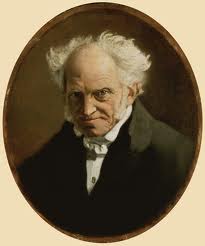
ARTHUR SCHOPENHAUER ON THE "HOAXOCO$T"

There is no opinion, however absurd, which men will not readily
embrace as soon as they can be brought to the conviction that it is
generally adopted. Example affects their thought just as it affects
their action. They are like sheep following the bell-wether just as he
leads them. They would sooner die than think. It is very curious that
the universality of an opinion should have so much weight with people,
as their own experience might tell them that its acceptance is an
entirely thoughtless and merely imitative process. But it tells them
nothing of the kind, because they possess no self-knowledge whatever.
It is only the elect Who Say with Plato: [Greek:
tois pollois polla dokei] which means that the public has a good many
bees in its bonnet, and that it would be a long business to get at
them.
But to speak seriously, the universality of an opinion is no proof,
nay, it is not even a probability, that the opinion is right […]
[…] so-called universal opinion is the opinion
of two or three persons; and we should be persuaded
of this if we could see the way in which it really arises.
We should find that it is two or three persons who, in the first
instance, accepted it, or advanced and maintained it; and of whom
people were so good as to believe that they had thoroughly tested it.
Then a few other persons, persuaded beforehand that the first were men
of the requisite capacity, also accepted the opinion. These, again,
were trusted by many others, whose laziness suggested to them that it
was better to believe at once, than to go through the troublesome task
of testing the matter for themselves. Thus the number of these lazy
and credulous adherents grew from day to day; for the opinion had no
sooner obtained a fair measure of support than its further supporters
attributed this to the fact that the opinion could only have obtained
it by the cogency of its arguments. The remainder were then compelled
to grant what was universally granted, so as not to pass for unruly
persons who resisted opinions which every one accepted, or pert
fellows who thought themselves cleverer than any one else.
When opinion reaches this stage, adhesion becomes a duty; and
henceforward the few who are capable of forming a judgment hold their
peace. Those who venture to speak are such as are entirely incapable
of forming any opinions or any judgment of their own, being merely the
echo of others’ opinions; and, nevertheless, they defend them with all
the greater zeal and intolerance. For what they hate in people who
think differently is not so much the different opinions which they
profess, as the presumption of wanting to form their own judgment; a
presumption of which they themselves are never guilty, as they are
very well aware. In short, there are very few who can think, but every
man wants to have an opinion; and what remains but to take it
ready-made from others, instead of forming opinions for himself?
Since this is what happens, where is the value of the opinion even of
a hundred millions? It is no more established than an historical fact
reported by a hundred chroniclers who can be proved to have
plagiarised it from one another; the opinion in the end being
traceable to a single individual.1 It is all what I say, what you say,
and, finally, what he says; and the whole of it is nothing but a
series of assertions:
Dico ego, tu dicis, sed denique dixit et ille;
Dictaque post toties, nil nisi dicta vides.
[Translation into Chico Marx talk: “At’s a whatta I say, at’s a
whatta you say, at’s a whatta everybody he say, but nobody, he’s a
never see it.” .C.P.]
THE ART OF BEING RIGHT, Arthur Schopenhauer, P. 32